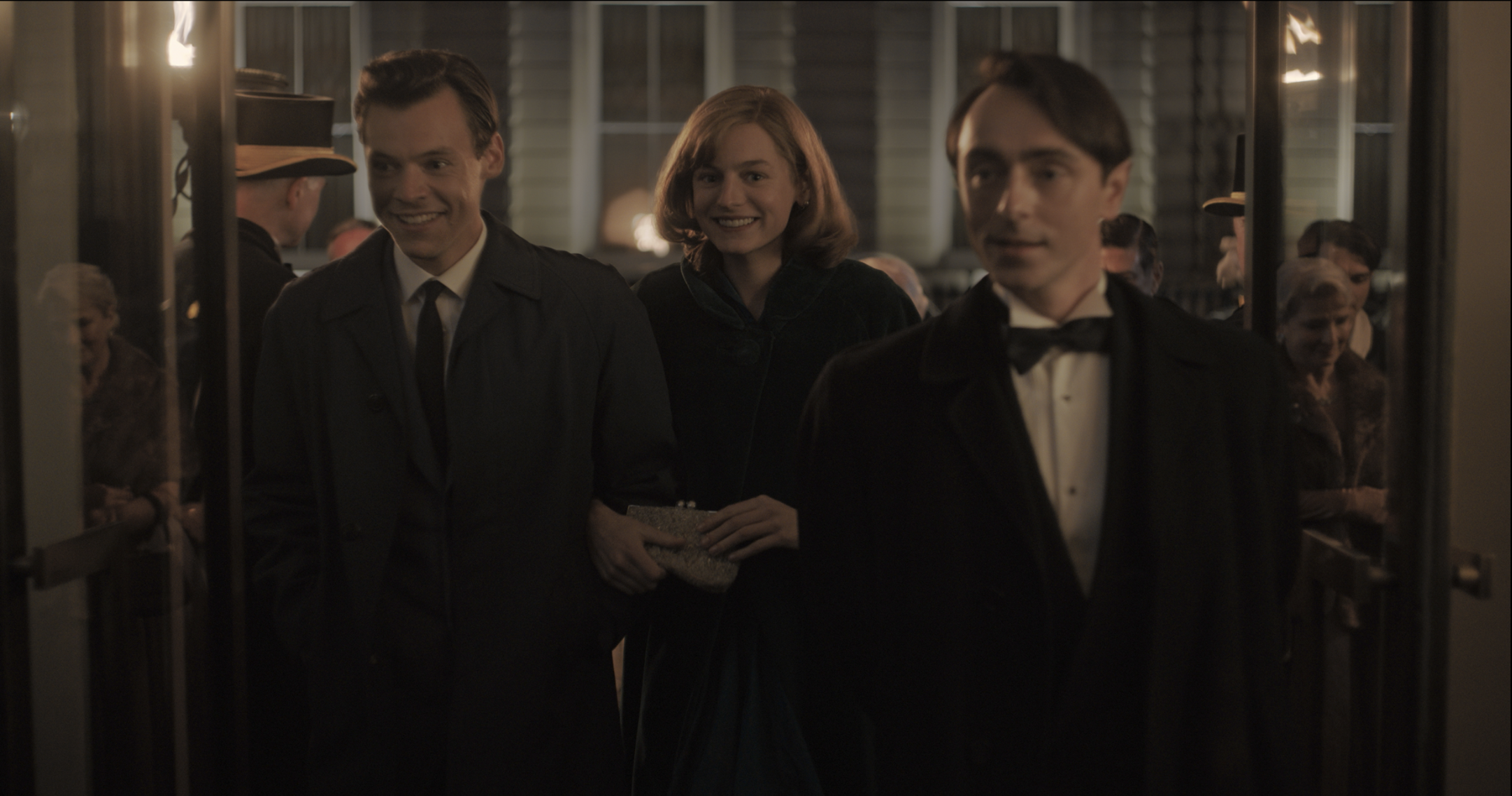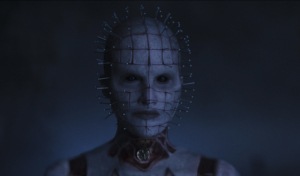From the opening shots of waves crashing in Brighton on a gloomy day, with suspenseful strings humming in the background, My Policeman (2022) establishes its relationship with the inevitable: the music and gray-blue hues evoke a sense of foreboding, but the waves continue to ebb and flow, unchanged by the happenings of our lives. Through the film’s dual timelines, its protagonists, enmeshed in a decades-long love triangle, grapple with their unmoving fates, confined both by the oppressive homophobia of mid-century British society and, in the modern day, the consequences of their past actions.
The film’s nonlinear narrative style, beginning in the present and cutting intermittently to 1950s Brighton, makes viewers lose hope in a happy ending for the postwar forbidden love story between young Tom Burgess (Harry Styles) and Patrick Hazlewood (David Dawson). Instead, we know from the outset that Tom ends up with his girlfriend-turned-wife Marion Taylor (Emma Corrin), and the aged couple in the present day (Linus Roache and Gina McKee, respectively) assume the responsibility of caring for Patrick (Rupert Everett) as he suffers health complications following a stroke.
Through its beautiful cinematography and compelling performances from its stars, My Policeman ensures that despite their relationship’s foretold end, viewers will experience the heartbreak alongside Tom, Patrick, and Marion as they attempt to navigate the ramifications of the 1950s’ restrictive social culture.
Based on Bethan Roberts’ 2012 novel of the same name, the film adaptation directed by Michael Grandage maintains a distinctly literary tone through its use of visual motifs. For instance, in the flashback sequences, water represents impenetrable boundaries for Marion and Tom, confining them to the limits of their contemporary society that expects women to be housewives and queer people to remain inconspicuous. During young Marion’s first encounter with Tom, she stares longingly at the ocean from afar, wishing she knew how to swim; Tom offers to teach her, figuratively leading her into the treacherous waters of traditional courtship and domesticity. Later, in a stunning shot, young Tom sits alone on the beach at sunset, right before he makes the decision to accept Patrick’s necessarily clandestine invitation to his apartment under the cover of the night.
The film employs another familiar—if overdone—visual motif through its use of cool hues for the scenes in the loveless present, and warm overtones for the vibrant past. While this helps orient viewers as to whether they are in the present or in a flashback, it also invites Grandage and cinematographer Ben Davis to make more artistic choices in their weaving of the two timelines. One such method is the emphasis on hands as an emblem of continuity—we often see shots of the young cast’s hands in a yellowy-orange hue of the 1950s cut to the hands of their older counterparts cast in cooler tones, most strikingly in the film’s moving final scene.
While the film’s visuals contribute to a cohesive narrative spanning time periods, the necessity of casting two actors for each role creates challenges to character continuity. This is a feat not-so-expertly executed in the casting of both Styles and Roache as Tom. Roache’s Tom comes off as stubborn, morose, and aggressive, while his younger self, played by Styles, is good-humored and juvenile. As a young man, Tom is often seen from just the neck up at the dining table, as if he’d need a booster seat to even reach his plate, and naive to the subjects of art, politics, and sex. It is conceivable that the events of his early life would have made Tom cynical as he aged, but the two Toms are virtually irreconcilable, not even sharing a similar cadence to their voice, making their casting as two versions of the same person somewhat questionable.
Despite taking viewers through key inflection points and milestone events in the lives of its protagonists, My Policeman is driven first and foremost by its characters, rather than being anchored by plot events. This style of storytelling demands both top-notch performances from its actors and an exceptionally written script; while the film delivers on the former, it falters on the latter. In key moments, the dialogue takes away from the emotional weight that this story ought to carry, and disrupts the momentum so that the film’s poignant, bittersweet conclusion falls short of its potential impact. This ineffective writing most affects the portrayal of Marion, at times reducing her to a vindictive, selfish figure when one can imagine how she is almost just as much a victim of the broader systemic issues that affect Tom and Patrick. For instance, during a pivotal scene in which she confides in a friend about her growing discomfort with Tom’s infidelity and sexuality, the script overlooks Marion’s genuine heartbreak at the loss of her supposed soulmate, instead focusing solely on her anger and deep-seated homophobia.
In doing so, the script also limits the scope of Corrin’s acting, which pales in comparison to the deeply moving performances delivered by Styles and Dawson. My Policeman is undoubtedly the highlight of Styles’ nascent acting career, as he pairs his innate boyish charm with an impressive capacity for subtlety, masterfully capturing a young man caught between the pressure to follow ingrained norms on the one hand, and his conflicting true desire on the other.
While Styles is less convincing in the film’s more heated scenes that demand rage and yelling, he shines in the many muted, vulnerable moments. When Tom stumbles in drunk to Patrick’s apartment expressing guilt for their earlier sexual encounter—as he believes it is a moral transgression—viewers feel the gut-wrenching pain through Styles’ gasping sobs and defeated body language. In one visually stunning sequence, two scenes in the art museum where Patrick works are cut together—one with Marion present, and one with just Tom and Patrick. In both, Tom steals glances at his true beloved, communicating both longing and pain with a single fleeting look. For his part, Dawson brings the quietly fearless, worldly Patrick to life, educating the unsophisticated Tom on culture through art—and a trip to Venice—and easing him into their sexual encounters.
Some of My Policeman’s most effective moments are also its most intimate. The actors excel at staying true to their roles even at times when dialogue is sparse, so that each sex scene contributes meaningfully to character development and plot progression. From the tenderness and hesitation of Tom and Patrick’s first encounter to the intensity and yearning with which they approach future scenes, the film highlights how their sex matures in parallel with the evolution of their relationship. Meanwhile, Tom and Marion’s sex life is depicted as dull, repetitive, and unrewarding—the camera steadies on Marion as her face transitions from expectant to dissatisfied, immobile while Tom passionlessly moves above her.
Complicated by the occasional poor decision-making on the part of its characters, particularly Marion, My Policeman is a story with neither villains nor definitive heroes. Instead, the film merely presents three endearing figures who find themselves in unimaginably difficult circumstances that would test the character and resolve of even the most compassionate and well-intentioned people. While the film opens with a hopeless view of fate as an irreversible force, unaffected by our best efforts, it closes on a more optimistic note. After decades of resigned stagnation and endless obstacles, Tom, Patrick, and Marion take charge of their lives and reckon with their collective past. For the first time, we see the present day bathed in warm lighting, and the rhythmic crashing waves no longer feel claustrophobic, but rather a reassuring reminder of the vastness and freedom of endless possibilities for the future.





